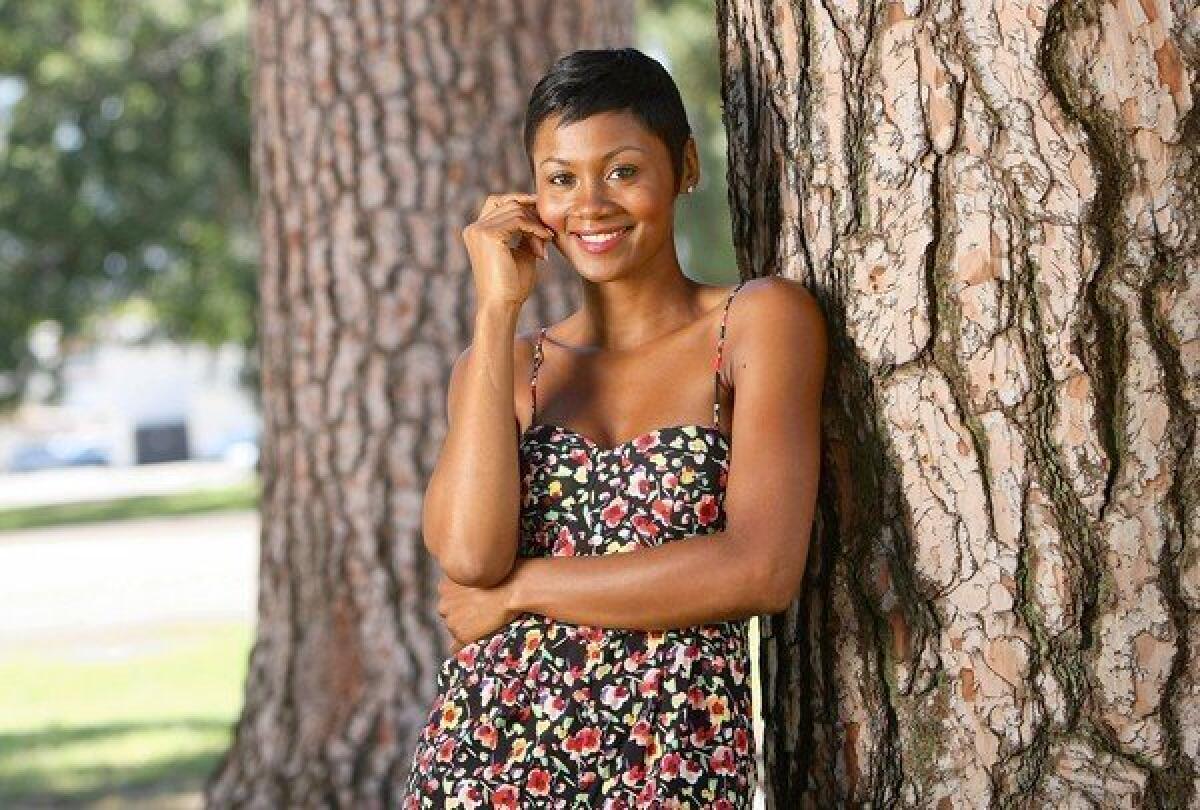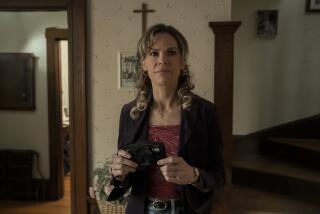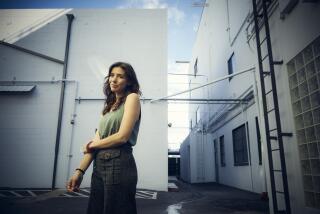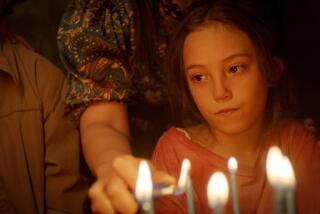Emayatzy Corinealdi finds a good role in ‘Middle of Nowhere’

In the new film “Middle of Nowhere,” Emayatzy Corinealdi plays Ruby, an aspiring doctor who puts medical school on hold to spend hours commuting to and from the prison where her husband is serving an eight-year sentence, five with good behavior for his involvement in a nonviolent crime.
It’s an aspect of the incarceration story that’s rarely told — what happens to the loved ones of the convicted, the people existing in a state of suspended animation waiting for their lives to resume. The complexity of the role, Ruby’s self-sacrifice and increasing emotional isolation, was something Corinealdi had waited a long time to find.
The up-and-coming actress spent years turning down parts she felt lacked substance or stereotyped black women, either by how they dressed, acted or spoke.
“Moving here to L.A., it’s so easy to do everything that comes your way,” Corinealdi said at a lunch spot near her North Hollywood home. The 32-year-old attracted little attention on the street, despite her striking pixie haircut, prominent cheekbones and soulful brown eyes. “Making that choice may have extended my journey a bit, but when something as beautiful as this comes along, I believe there will be more of it, and that’s what I look forward to.”
“Middle of Nowhere,” which opened in theaters Friday, is the second narrative feature from the Los Angeles-based writer-director Ava DuVernay, who landed the best director award at the Sundance Film Festival this year and partnered her distribution company African-American Film Festival Releasing Movement (AFFRM) with Participant Media to release the film in theaters. She selected Corinealdi from a slew of name thirtysomething black actresses clamoring for the lead role in the searing drama.
“This wasn’t about more name recognition but any name recognition,” joked DuVernay. “I mean she’s got a lovely name, but no one knows it.”
Yet something about Corinealdi, who initially auditioned to play a supporting role, gripped DuVernay.
“She has a real combination of strength and vulnerability and for whatever reason I had to see her,” added DuVernay, who counted on Corinealdi to fill the screen in every frame of the film, often in moments where she is alone, deep in thought. “Part of it could have been that she was a blank canvas. I hadn’t seen her in anything else. She really captured this sense of isolation.”
Part Panamanian, part Italian, Corinealdi’s unusual moniker came from her father’s interest in naming her after a Panamanian princess, Ematy, and her mother wanting to call her Brandy. And until DuVernay came along it was a name that had never appeared anywhere significant on a feature film call sheet.
Living in Los Angeles for the last decade, the aspiring actress supported herself with small parts in television movies, “The Young and the Restless” and a failed pilot where she was cast as the lead. She turned down many roles if they didn’t meet her high standards.
“I love Meryl Streep. I love Denzel Washington. So I made the kind of choices I think could amount to that kind of career,” she said.
DuVernay tapped into Corinealdi’s willingness to wait for the right part to help her find the character of Ruby.
“We were able to connect to this idea of Ruby and her idea of waiting, waiting for something that’s important,” DuVernay said. “Her work as an actress was as important to her as Ruby’s husband was to her. It’s her love. And once we were able to get to that place, it started to really get personal.”
Corinealdi, an Army brat, was born in Kentucky but lived in Germany, Ohio, New Jersey and Kansas throughout her childhood. She decided only in her senior year of high school that she would pursue acting — once she discovered that her initial plans of becoming a litigator were not about the law but rather the desire to play one on TV.
She studied first in New Jersey at the Actor’s Training Studio before moving to New York, where she enrolled at the William Esper Studio. Her journey cross-country in her banged-up Nissan Sentra culminated with studies at Playhouse West. Before 2007, Corinealdi supported herself with a variety of odd jobs — personal trainer, personal chef, professional assistant — before she quit to act full time.
“When I moved here I promised myself I wouldn’t get a 9-to-5 job. I’m very well organized, so I can go into an office environment and become an executive assistant and then move up and become the owner of the company,” said Corinealdi with a laugh. “I’m really good at those things, so I didn’t want to start doing that.”
With the exception of getting into better auditions, life hasn’t changed much for Corinealdi. But the actress is hopeful that the film’s reception will alter her fate. Early reviews out of Sundance were strong, with the Hollywood Reporter writing, “Corinealdi projects enough intelligence and backbone to make us believe a character who might’ve been bothersomely perfect in another actress’ hands,” while Indiewire called her performance “restrained, though affecting” and “fiery when she needs to be, without falling into melodramatic traps.”
Success isn’t a guarantee. DuVernay, who spent decades in publicity and marketing before debuting her first feature film last year, fears that Corinealdi’s career will suffer the same fate that befalls many black actresses of the same age.
“I fear for her,” DuVernay said. “I want her to have everything she should have. I want her to have the same opportunities as Brit Marling and Elizabeth Olsen, other women who come out of Sundance with films that are acclaimed and have their pick. I hope that it happens.”
Corinealdi refuses to be limited by her minority status. She is energized about her future, an outgrowth of the optimism that has fueled her career for the last decade.
“The truth is I’m a black actress in Hollywood, and that’s hard,” she said. “But that doesn’t mean I have to live in that space. It’s our responsibility to try and change that, to do whatever we can contribute to make that change. That’s the important thing.”
More to Read
Only good movies
Get the Indie Focus newsletter, Mark Olsen's weekly guide to the world of cinema.
You may occasionally receive promotional content from the Los Angeles Times.






